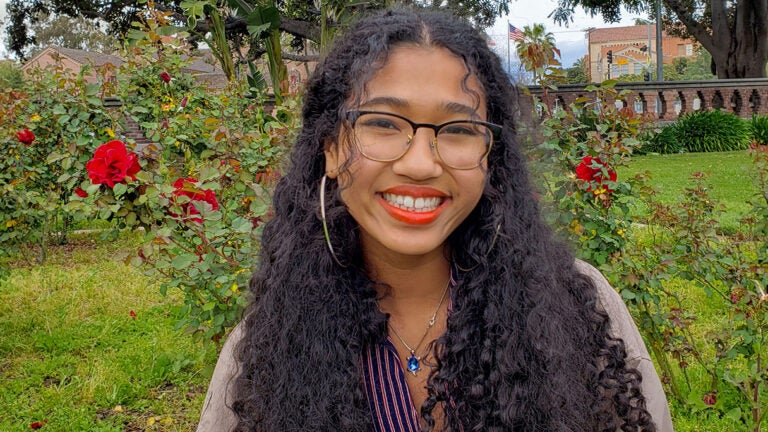
First-gen Trojan aims to serve, whether by mentoring students or identifying bodies
Growing up in South Los Angeles, Angelina Crittenden loved procedural crime dramas. She was especially drawn to the crime lab technicians who helped crack cases with science.
“The ones in the lab coats knew everything,” Crittenden said. “They had all the answers, and I thought that was so cool.”
Her favorite character was Max Bergman, the chief medical examiner on Hawaii Five-0 played by Masi Oka.
“I thought he was so bright and so witty, and he always had the info the team needed,” she said.
From that initial connection with a fictional character’s career, her interest grew like a vine, spreading into the crevices of science and medicine. Today, her goal is to become a forensic pathologist.
Forensic pathologists are specially trained physicians who examine the bodies of those who die unexpectedly or violently. Also known as medical examiners, these professionals determine cause and time of death and, more importantly for Crittenden, play a key role in identifying people who die unnamed.
“I started researching the position and found there’s a real crisis here where I grew up,” said Crittenden, a first-generation college student who is majoring in human biology with a minor in forensics and criminality at USC Dornsife College of Letters, Arts and Sciences. “For some people to be reconnected with their families after they die, first you have to find out who they are. I can help create those reunions and bring closure to lives and families.”
A rare pair of first-gen leaders on a mission
Crittenden spends about eight hours a week leading a first-generation mentorship program with Matthew Torres, a psychology major at USC Dornsife and QuestBridge scholar. The pair built the First Generation Student Leadership Program from scratch earlier this year, expecting about 60 first-gen freshmen to be interested. They ended up with almost 370.
The pair share a passion for helping other first-gen students, though their backgrounds differ. Growing up, Torres moved often with his mom and sister. As a Mormon, he learned to connect with others during a mission in Canada for the Church of Jesus Christ of Latter-day Saints.
“It taught me how to talk with someone I’d never seen in my life, how to strike up a conversation,” Torres said. “It helps me connect first-generation students with mentors. Our mentors are already in college, they have the connections first-gen students need to get scholarships, internships, resources and social connections to succeed.
“Some of them, like me, can’t really talk to their families because they’ve never had the college experience,” he added. “This is uncharted territory for first-gen students. The message Angelina and I send is: ‘You’re not on your own; we understand.’”
A medical examiner dream and a desire to help
Crittenden could spend as many as 15 years in higher education by the time she completes medical school, residency and fellowship and becomes a medical examiner.
More than a thousand bodies go unclaimed in Los Angeles County each year. Most will be cremated, held for three years while officials try to find next of kin and eventually buried in a single grave. A few remain unidentified and are given the last name “Doe.” Those are the lost souls Crittenden most wants to help.
“I want to expand the identification practice,” she said. “Right now, it’s left to dental records, DNA and fingerprints. I’d like to include optics like iris scans or other identifiers. I guess my patients won’t be alive, but I can still help them just by finding out who they are.”